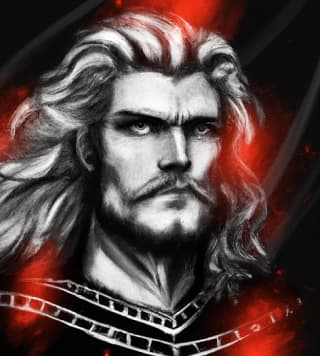Dellingr - God of Norse Mythology

Dellingr is a prominent figure in Norse mythology, associated with the dawn and the creation of the world.
Dellingr (pronounced: "DELL-ingr") is a god in Norse mythology, and is mentioned in various traditional sources, including the Poetic Edda, the Prose Edda, and the legendary saga Hervarar saga ok Heiðreks. He is known as the father of Dagr, the personification of day, and the third husband of Nótt, the personification of night. His name may mean "the dawn" or "the one who shines."
The name "Dellingr" in Old Norse runes is written as:
ᛞᛁᛚᛚᛁᛝᚴᛦ
In the Poetic Edda, Dellingr is mentioned in the poems of Vafþrúðnismál, Hávamál, and Fjölsvinnsmál. In Vafþrúðnismál, he is referred to as the father of day, while night was fathered by Nör. The new and waning moons were created by the gods to count the years for men. In Hávamál, the dwarf Þjóðrœrir performs an unnamed spell "at the gates of Delling." In Fjölsvinnsmál, Svipdagr asks what a god has made for a great room he sees, and Fjölsviðr responds with a list of names, including Dellingr.
In the Prose Edda, Dellingr is mentioned in Gylfaginning, where the figure of the Most High, one of Odin's many names, describes him as a god and the third husband of Nótt. Dellingr and Nótt gave birth to Dagr, who inherited his father's features and was described as "bright and beautiful." Odin placed Dagr and Nótt in the sky so that they could travel through it with their horses and carriages every 24 hours.
In the legendary saga Hervarar saga ok Heiðreks, there are five riddles that include the phrase "Delling's gates" (Old Norse Dellings durum). The phrase is also mentioned in Hávamál, where the dwarf Thjódrørir sings at the gates of Delling.
Some scholars have proposed that Dellingr is the personification of twilight, similar to his son Dagr, who personifies day. Jacob Grimm suggests that Dellingr is the assimilated form of Deglingr, which includes the name of Dellingr's son, Dagr. Grimm suggests that the ending "-ling" may refer to ancestry, indicating that Dellingr could have been the "parent in his presence" or the reverse order of succession.
In Norse mythology, Dellingr is not as well-known as other gods such as Odin, Thor, or Loki. Nonetheless, his role as the father of Dagr and husband of Nótt makes him an important figure in the mythology of the Nordic peoples.
Please note that the information provided about Dellingr and Norse mythology is complex and may be subject to interpretation and debate. The myths and stories of Norse mythology have evolved and been passed down through oral tradition and written accounts, and there may be variations in the way they are told and understood. This information should be used as a general reference and not as a definitive source on the subject.
If you notice an error on this web page, please email us at contact@historylists.org and let us know about it. Please be sure to include a brief description of the mistake you have noticed, along with the location of the mistake on the web page (e.g., the specific section or paragraph where it appears). We appreciate your help in keeping our website accurate and will use the information you provide to make necessary updates as soon as possible. Thank you for your assistance!
Other Norse Gods and Goddesses
- Baldr (Æsir) - God of Light, Beauty, and Goodness.
- Beyla (Æsir) - Goddess of Agriculture.
- Borr (Æsir) - Father of the Norse Gods.
- Bragi (Æsir) - God of Poetry and Song.
- Byggvir (Vanir) - God of Agriculture.
- Dagr (Æsir) - God of Day.
- Dellingr (Æsir) - God of the Dawn.
- Eir (Ásynjur) - Goddess of Healing and Protector.
- Forseti (Æsir) - God of Justice and Reconciliation.
- Freyja (Vanir) - God of Love, Fertility, War, and death.
- Freyr (Vanir) - God of Fertility and Prosperity.
- Frigg (Ásynjur) - Queen of the Gods.
- Fulla (Ásynjur) - Goddess of Fertility.
- Gefjon (Ásynjur) - Goddess of Fertility.
- Gná (Ásynjur) - Messenger of the Gods.
- Gullveig (Vanir) - Goddess of Witchcraft and Sorcery.
- Heimdall (Æsir) - Watchman of the Gods.
- Hel (Æsir) - Goddess of the Underworld.
- Hermóðr (Æsir) - Messenger of the Gods.
- Hlín (Ásynjur) - Goddess of Protection.
- Höðr (Æsir) - God of Darkness.
- Hœnir (Æsir) - God of Creation.
- Iðunn (Ásynjur) - Goddess of Immortality.
- Jörd (Ásynjur) - Goddess of the Earth.
- Kvasir (Vanir) - God of Wisdom.
- Lóðurr (Æsir) - God of Creation.
- Lofn (Ásynjur) - Goddess of Love.
- Loki (Æsir) - God of Mischief and Deception.
- Magni (Æsir) - God of Strength.
- Modi (Æsir) - God of Courage.
- Mimir (Æsir) - God of Wisdom.
- Nanna (Ásynjur) - Goddess of Love and Devotion.
- Njörðr (Vanir) - God of the Sea and Fertility.
- Nótt (Æsir) - Goddess of the Night and Dreams.
- Odin (Æsir) - God of Creation and King of the Gods.
- Rán (Ásynjur) - Goddess of the Sea and Death.
- Sága (Ásynjur) - Goddess of Wisdom.
- Sif (Ásynjur) - Goddess of Abundance.
- Sigyn (Ásynjur) - Goddess of Loyalty.
- Sjöfn (Ásynjur) - Goddess of Love.
- Skaði (Ásynjur) - Goddess of Hunting, Skiing, and Winter.
- Snotra (Ásynjur) - Goddess of Wisdom.
- Sól (Ásynjur) - Goddess of the Sun.
- Thor (Æsir) - God of Lightning and Protection.
- Týr (Æsir) - God of War and Justice.
- Ullr (Æsir) - God of Skiing, Archery, and the Hunt.
- Váli (Æsir) - God of Revenge.
- Vár (Ásynjur) - Goddess of Oaths and Agreements.
- Vé (Æsir) - God of Creation.
- Víðarr (Æsir) - God of Vengeance.
- Vili (Æsir) - God of Creation.